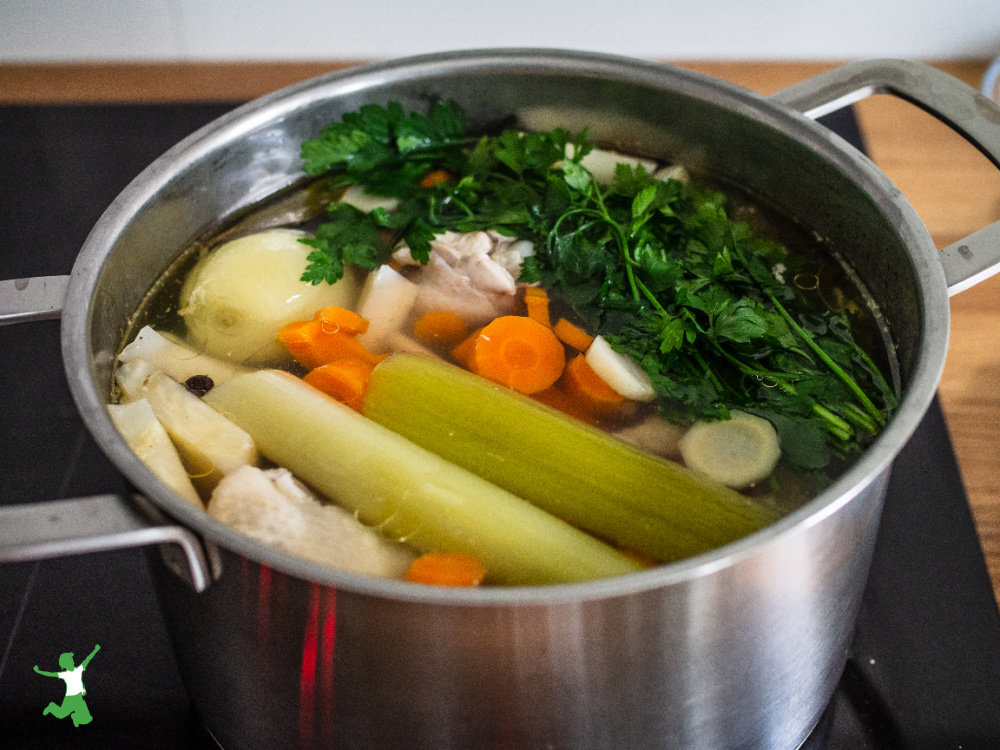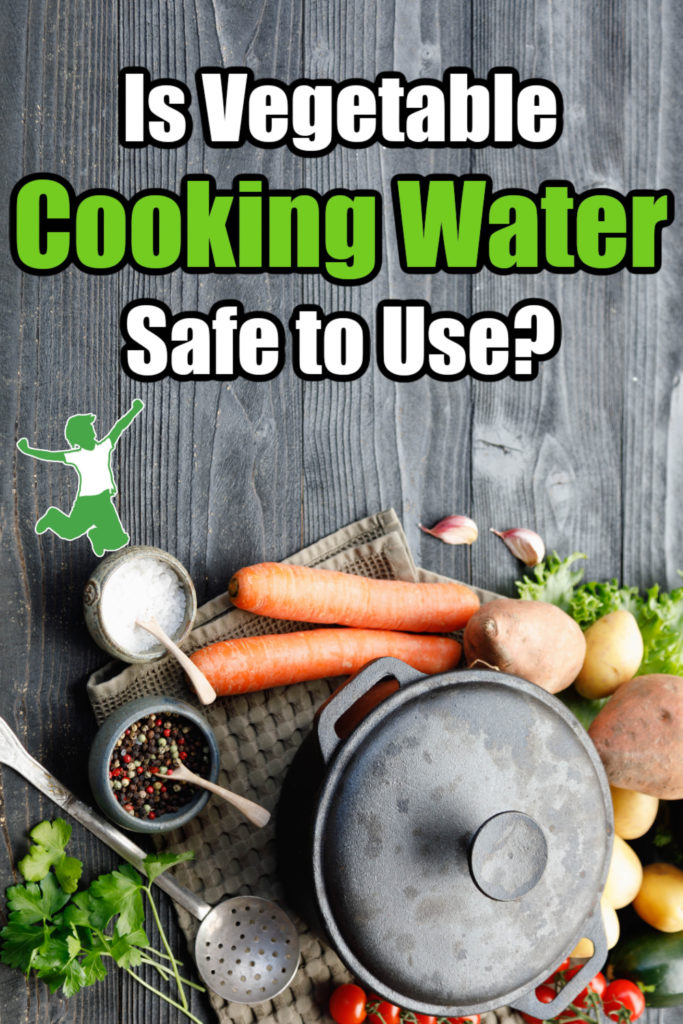Guidelines for when vegetable cooking water is safe to use and when it is best to toss due to nitrites, residues or anti-nutrients that can do more harm than good.

Adelle Davis popularized the practice of saving vegetable cooking water during the Leave it To Beaver era of the American 1950s.
She reasoned that any vitamins and minerals lost from cooking the vegetables would end up in the water.
This supposedly nutrient-rich cooking water could then be added to homemade soups or sauces with the nutrition benefiting those that consumed them.
This notion took hold and has not let go to this day.
Unfortunately, reserving vegetable cooking water can do more harm than good.
Consider the reasons below before you use it in your dishes. How to know your veggie cooking water is safe is discussed as well.
Chemical Residues
If the vegetables that are cooked are not organic, pesticides and nitrites from commercially produced fertilizers can end up in the cooking water.
Even low to no spray veggies such as asparagus would not be safe.
These crops are still typically fertilized with commercial preparations that are high in nitrites.
Anti-Nutrients
Cooking cruciferous vegetables such as broccoli, cauliflower, cabbage, Brussels sprouts, and kale would add goitrogenic (thyroid blocking) substances to the cooking water which should be discarded.
Water used to boil potatoes would contain chemicals called hemagglutinins that disrupt red blood cell formation.
Dark green, leafy vegetables such as beet greens, raw spinach, and chard contain oxalic acid that blocks calcium and iron absorption.
This irritating substance also can cause distress to the sensitive mucous membranes in the mouth and intestinal tract and contributes to the formation of kidney stones.
Consuming raw crucifers or dark, leafy greens is not an alternative either as the substances that cause problems when in the cooking water also cause problems if consumed directly with the vegetable in an uncooked state such as a raw green smoothie.
Legumes & Beans
For the last few years, the vegan community has popularized the trend of reusing legume cooking water, particularly from chickpeas.
This isn’t a safe practice even if the legumes or beans are soaked before cooking.
This soapy, slimy water is called aquafaba and is used as an egg replacement, particularly in dessert recipes. It whips up foamy just like egg whites.
Published research reveals that chickpea cooking water contains saponins, a potent anti-nutrient that contributes to leaky gut, which is at epidemic levels today.
It is also not advisable for pregnant women to consume this substance as it is a miscarriage risk.
Safe Vegetable Cooking Water
Do you really want to use vegetable cooking water as a frugal tool in your kitchen routine?
Consider this list of some of the most popular vegetables below. They are safe to use for that purpose.
- carrots
- turnips
- potatoes (peelings)
- parsnips
- beets
- celery
- organic pumpkins and squash (including zucchini)
- organic onions, leeks, and garlic
- nightshades (tomatoes, eggplant, and peppers among a few others)
For example, this potassium broth recipe uses vegetables simmered in water from the list above.
Simple Guidelines To Follow
Do you find it confusing to remember the distinctions between which organic veggies are safe to use and which are not?
Or, do you buy some veggies organic and others conventional?
If so, it is best to just adopt the practice of not using the cooking water at all.
This is particularly true if you tend to mix veggies together when cooking them.
Never Use Veggie Water for Baby Food
It is of particular importance NOT to use vegetable cooking water for use in pureeing homemade baby food.
Use pure filtered water instead, or if baby is old enough, some homemade bone broth or meat stock.
Final Caution to Consider
One final word of caution.
All vegetables tend to form nitrates after cooking and during storage. These nitrates can transform into strong carcinogens in the intestines.
Hence, it is best to avoid refrigerating and reheating vegetables, particularly leafy, green vegetables which concentrate nitrates when grown commercially.
References
Nourishing Traditions Cookbook









Thanks for the informative article!
I’m using a special clay steamer which sits on top of a regular pot. It has a chimney inside of it, and a clay cover. This allows you to cook your veggies using the steams that accumulate inside of it. These steam eventually turn into water and it makes a delicious soup as a “side product” of your steamed veggies. Would you say that the same applies when using this cooking\steaming method? Would your avoid drinking the accumulated water when steaming crucifers etc.?
1: Can you clarify that last part, are you saying not to cook vegetable and then store them (as in I can’t Blanche kale and then freeze right away for later?) because that would also be cooking, storing and then later reheating.
And 2: I read about bieler broth on your site a long time ago and it was boiling veg in order to drink broth. Do you not recommend bieler broth now?
Thanks
What I meant was don’t cook greens and then store for later. This will increase the nitrates which are carcinogenic. Always cook greens and use immediately.
The bieler broth article was another site … I’ve not written about this ever.
Your saying we should not make organic vegetable Broth?
I’m so confused now.
I steam my organic veggie when we eat them.
But to make homemade veggie broth and freeze it, it’s now a No,No?
I also buy Trader Joe’s organic low sodium veggie broth ,
And your saying ,No?
I’ll wait for your answer.
Thank you.
Some veggies are ok … please refer to the article for when to toss and when to use.
Is it best to steam or boil these vegetables? Also, is it only non-organic vegetables that should not be stored and reheated? Thank you.
So is it better not to cook potatoes in the pressure cooker (with broth) and then mash them to make mashed potatoes?
Will the toxins from the potatoes stay in the mashed potatoes since we are not discarding the water/broth it cooked in?
So is it better to boil the potatoes first, discard the water, then add the broth to make the mashed potatoes?
and how do you usually eat your cruciferous vegetables? Do you always boil them then discard the water?
We were always told it’s best to cook with a little water and then keep the water and season
Some veggies that is a good method. For crucifers, I cook in water and discard the cooking water to reduce the anti-nutrients as much as possible. Heat alone will do some of the job, but I prefer to reduce them as much as possible.
Boiling potatoes is the best way to cook them. That way, no acrylamides form either.
Thank you for an excellent article. I was drinking my veg cooking water, and my TSH level went above normal. So I used it instead only for washing food and my next TSH result was just within the normal range. But as I eat brassica every day (including broccoli heated at 60degreesC for 10 minutes, a la Elizabeth Jeffery), I decided to start taking a tablet of sea kelp every day, as I would expect the blockage of iodide by thiocyanates to be competitive. Am I right?
If you say you wish it, I shall endeavour to remember to report my next TSH result to you.
By the way, I like jacket potatoes, including the skin (I microwave them completely and only then (while hot) grill and bake them) . What are the dangers therein?
Any difference for baking cauliflower, broccoli & brussels sprouts and boiling them concerning the thyroid? I never enjoyed these and never tried brussels sprouts until I started baking them with a little olive oil & sea salt and now try to eat at least a cup everyday.
Heat alone will break down some of the oxalic acid, but you will get rid of more when cooking in hot water. Exercise your best judgment and use in moderation if thyroid issues are present. Personally, if I had thyroid issues, I would be careful to eat very small amounts of crucifers.
Surely, cauliflower, broccoli & brussels sprouts , aren’t the veg that contain oxalic acid, are they? Surely it isn’t the thyroid that oxalic acid goes for, particularly, is it? Aren’t the goitrogens in these brassica principally thiocyanates, which inhibit iodine uptake and utilisation?
What I don’t know is whether the inhibition can be reversed by taking extra iodide (whether as sea kelp or straight inorganic iodide). The (bio)chemist in me would say yes, but there may be other factors, and I was hoping that you, Sarah, would be able to tell us about them if there were.
There are numerous antinutrients yes…depending on the vegetable, one could predominate over others. Some of the cruciferous vegetable are quite high in oxalic acid. https://www.thehealthyhomeeconomist.com/low-oxalate-diet/
We sometimes pour the water that the veg boiled in, into the garden – we figure it returns some nutrients into the soil
Great article. I always thought the left over water was nutritious. Thanks for clarifying.
Like other comments start to mention, then is it unsafe to eat cooked in other ways, but not boiled, spinach, broccoli, cauliflower, cabbage, Brussels sprouts, and kale? Or is it unsafe to eat these cooked in any other way other than boiled and drained, because the oxalic acid would stay in the spinach and the goitrogenic would stay in the rest if they are cooked in any other way than boiled and drained?
Small amounts roasted etc is fine for those with healthy thyroid function. Heat alone will break down some of the oxalic acid, but you get rid of more combined with water in cooking.